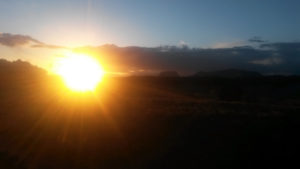 After spending a few hours unsuccessfully pushing Dolly, the WRFI van, off a sandy road as the sun set, we walked up the dirt road that rose to meet the mesa. Our host’s car headlights were shining on her willow branch topped hut. A large pot sat atop an open fire with aluminum foil maintaining the surprise of dinner. Everyone smiled, elated to be at our host’s farm.
After spending a few hours unsuccessfully pushing Dolly, the WRFI van, off a sandy road as the sun set, we walked up the dirt road that rose to meet the mesa. Our host’s car headlights were shining on her willow branch topped hut. A large pot sat atop an open fire with aluminum foil maintaining the surprise of dinner. Everyone smiled, elated to be at our host’s farm.
We stayed with Dorothy on the Hopi reservation for three days to help her tend to her new garden. Every night we sat around the campfire while she shared her cultural teachings with us. The land is central to the long-lived Puebloan religion. Even though our host quickly shared what she felt comfortable with, I learned some of the complexities of Hopi tradition.
My original idea for this journal was to demonstrate the resilience of Hopi culture with what I learned from our host. After thinking on it, I ultimately decided against it because of what we experienced on Hopi. She told us that most research and books published about the Hopi people were published without proper permission or were incorrect. This incredible breach of trust is sometimes used merely for personal profit, with little regard for the effect it might have on the Hopi. The history of information abuse and fabrication by outsiders made me feel all the more honored that our host shared what she did with us.
I grew up in a relaxed Catholic tradition where, as a young adult, I was able to choose what I wanted to participate in. Along with being an American, I feel that my spirituality was never catered to my place. Looking back on it now, my faint sense of place on Lake Champlain as a child was never referenced as a relevant factor of my spirituality. In this way, I can understand how non-native Americans are attracted to a spiritual tradition that is centered in specific landscape. Cultural appropriation can become construed in that way because it often disregards the aspect that makes native religions unique, the place. When we visited our host on Hopi, she described the significance of corn to the Hopi people. But it seems wrong for me to attach an artificial spiritual connection to corn, because I don’t feel interconnected with corn and I don’t consider it mother corn.
It is not unusual for non-native Americans to have a fascination with place-based spiritualties. The nature of European colonization lacked respect for the earth, its resources, and the native people that inhabited it. While ironically after so many decades of brutality and disrespect of Native Americans by non-native Americans, many non-natives have developed a romanticized view of Native American spirituality. Romanticism and ignorance have led to inevitable misappropriation of spiritual traditions. The dominant religion and general mindset in the USA originates in the Christian tradition. Although the religion originated in the eastern Mediterranean, also known as the Levant, because of its history in Europe and it’s use throughout the rest of the world, (often by means of colonization), Christianity has largely lost its connection to place. Christianity transformed to relate to the lives of many different people on many different landscapes; therefore, once in the United States, it became clear, when compared to indigenous spiritualties, it didn’t connect to the landscape or many of the earth’s natural system.
Even though many Americans don’t identify as Christians, it is the predominant religion in the US and it played a large role in the formation of this country and its laws. I believe that our innate curiosity with native spiritualties stems from this uninformed and disconnected aspect of dominant American culture. While this curiosity should not be completely stifled, as non-natives we can sometimes make uninformed assumptions, exploit the knowledge that we obtain, or inappropriately take culture out of context. Anthropologists can overstep their boundaries in this regard. While the intention to share unfamiliar cultures and religions can be pure, it can often do more harm than good. Native Americans should have complete control over texts and information that attempts to disclose details about their way of life, because it reflects who they are. For that reason in particular I choose not to divulge all the information that was gifted to me and I recognize that though I was granted some new insights with what our host shared, she doesn’t represent all Hopi people nor do I understand the complexities of the Hopi tradition or identity.